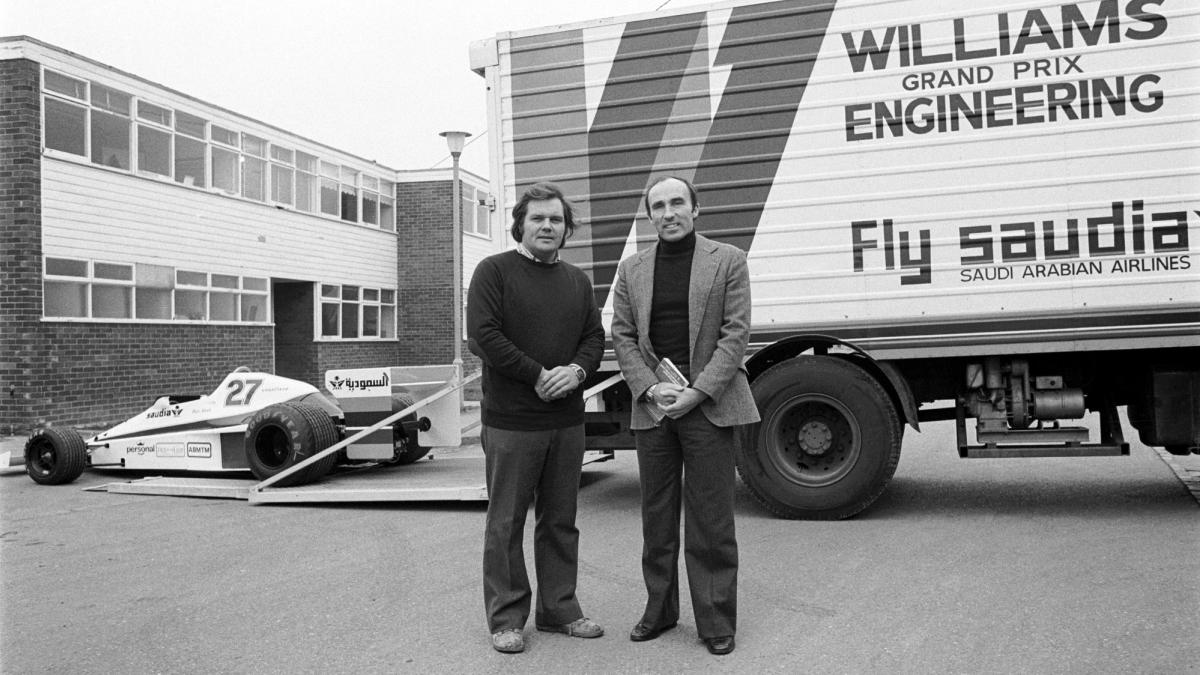Having been on the grid for nearly half a century, Williams Racing are, understandably, often called one of Formula 1's heritage or classic teams.
Just two constructors on today's grid have a longer history in the sport than us since our 1970s foundations, so there's a lot of backstory to cover if you're a new fan of F1 or the team.
To help you get up to speed with everything Williams Racing, or if you're a lifelong follower who wants a trip down memory lane, we've created guides on how Williams Racing of today came to be.
And where better to start than the early origins?
The Early Years: Frank Williams' Origins and Team Formation
While the modern Formula 1 world is a sleek and well-refined operation requiring immense manpower and pinpoint planning to function, the motorsport environment Frank Williams grew up in through his 20s and 30s was a wildly different story.
Privateer entries — cars bought from a supplier rather than constructed internally — were commonplace, and that's how Frank Williams made his initial foray into the paddock.
Frank Williams Racing Cars, effectively the forerunner to Williams Racing, made its first foray into the World Championship in 1969 at the Spanish GP, running a Brabham BT26A with a 3.0-litre Ford Cosworth V8 powering a single entry.
Piers Courage was the man to pilot the car after a stop-start F1 career spotted with some junior championship running in Frank's Formula Two and Tasman Series entries.
Although that maiden Spanish GP saw a Lap 18 engine failure, Courage advanced nine positions to take P2 at the 1969 Monaco GP two weeks later, properly announcing the Frank Williams name to the sport.
After doubling up that silverware-winning success at Watkins Glen in the US Grand Prix, the 1970s proved far less fruitful for Frank Williams Racing Cars.
A fatal crash for Courage in the 1970 Dutch GP and various issues with chassis development, staffing, and funding over the decade had Frank eventually lose majority ownership of the team to Walter Wolf, a Canadian millionaire, by 1976.
Although the newly formed Wolf-Williams partnership rapidly deteriorated, causing Frank to leave, his departure formed the groundwork for future success.
Establishing a Presence: Williams Grand Prix Engineering
Alan Jones in the FW06 on his way to our maiden podium at Watkins Glen in 1978
The transformational moment for Frank came in 1977 with the formation of Williams Grand Prix Engineering, a venture he embarked upon with Patrick Head, an astute and innovative engineer he hired as Chief Designer at Wolf-Williams.
This partnership proved to be a pivotal turning point — Head's technical expertise and Williams' leadership and vision combined to create a new force in Formula 1.
After a partial campaign in 1977 using a bought-in March chassis, Williams Grand Prix Engineering's subsequent seasons saw rapid development and significant progress, far surpassing what Frank Williams Racing Cars ever achieved.
Frank and Patrick (pictured in the main article image) debuted their first in-house car, the FW06, in 1978. It proved a competitive and reliable machine, qualifying for every race and reaching the podium at the US Grand Prix with Australian Alan Jones at the helm.
Winning with Williams: A Taste of Victory
Clay Regazzoni stands on the top step at Silverstone after securing our first win
Alan found his highest success at Williams, but the inevitable first F1 triumph did not come thanks to the capable hands of the Melbourne man.
The 1979 season saw veteran Swiss racer Clay Regazzoni joining to turn the Williams Grand Prix Engineering operation into a two-car team for the first time.
Patrick's ground effect FW07 creation replaced the FW06 partway through the season, and five grands prix later saw Alan take the team's first pole position at the team's home race, the British GP.
Alan was on course to take the win, leading Clay at the halfway point, but an engine failure handed the historic victory to his Swiss teammate — Frank's first top-step conquest in the sport.
Any disappointment for Alan was short-lived, though, as the FW07 was a potent machine that took the Aussie to the front, winning four of the next five races and surging the team to P2 in the Constructors' championship.
Incredibly, though, the best of that car and Alan was still to come...
2024 Season Launch
Sign up and claim your official Williams Racing Driver Card now, to receive all the details of our 2024 Season Launch first.
Related Tags:
Contact & Media
© the Williams Group, under licence to Williams IP Holdings LLC
Powered By










